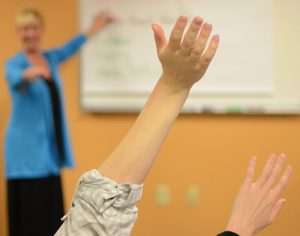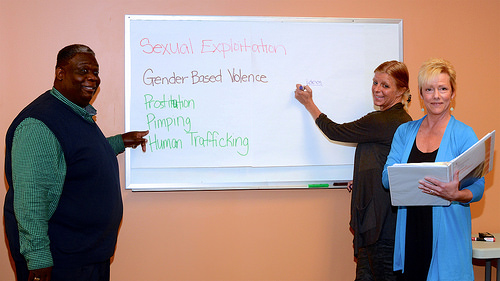Writer / Tonja Talley
Photographer / Ron Stiemert
Few crimes are more abhorrent yet challenging for communities to recognize and address than human trafficking. Acknowledging this fact, lead pastor Scott Luck of Stones Crossing Church called his congregation to action after the church witnessed a human trafficking film. Center Grove resident Jennifer Inabnitt recalls the day, “I remember sitting in my seat, and my heart ached for those children.”
With the movie still fresh in her mind, her son told of a conversation he had had with a seemingly distressed girl at school. Later in the year, newspapers unveiled the young girl’s story — a victim of sex trafficking. Could the conversation the girl had with Inabnitt’s son have been a cry for help? Inabnitt will never know. “The event spurred me to learn more and share the truth about sex trafficking. It allowed me the chance to tell others it is better to report something and be wrong than do nothing.”
Inabnitt quickly understood what she was learning meant more than just acquiring knowledge; her new awareness could reduce the risk of exploitation of children. Today, Inabnitt speaks to youth about the dangers of human trafficking. These crimes are no longer happening only in Third World countries. Statistics show the average age of American youth brought into commercial sex trafficking is 13 years old, and it affects both genders. Sex trafficking occurs all over the United States, from big cities to small towns. Inabnitt said pimps or traffickers are at malls, salons, schools, parks and even next door.
FEDERAL RESPONSE
The reality and severity of these crimes prompted a national awareness effort. Under the authority of the Office of the Attorney General and the Department of Justice, task forces were set up around the nation. The Indiana Protection for Abused and Trafficked Humans (IPATH) provides a coordinated state response to the problem of human trafficking with law enforcement, victim services and outreach efforts. To make communities aware of the human trafficking issue, IPATH’s outreach efforts provide professional education to interested businesses, organizations and groups, including our community’s youth.
IPATH’s outreach committee includes the Youth Working Group (YWG) committee, a team of individuals who reach out to Indiana’s youth. “Youth learn to spot threatening situations and become change agents in cultural thought that feeds into the sex industry,” said YWG co-chair Debi Alexander. “The program guides teachers and adult youth leaders in how to help at-risk teens.”
The YWG offers four free curriculums — one for adult leaders and three youth programs. All three youth programs have a goal of educating youth about the reality of trafficking, including how they can be involved in preventing it. The curriculum includes basic terminology and media literacy, and as the curriculum progresses, the class looks at who is involved in trafficking, the red flags for possible trafficking scenarios and the steps youth can take to stand up against this problem.
EMPOWERING YOUTH
The four-week Empower Youth to End Sexual Exploitation (EY) class offers all-male, all-female or mixed gender groups, whereas the national My Life My Choice (MLMC) curriculum requests only female groups due to the content.
Brian Carter, director of Dads Inc. and educator for Prevent Child Abuse Indiana, facilitates many of the all-male EY classes. He said the young men question how human trafficking could ever involve them. Carter explains their attitude has a lot to do with stopping the exploitation.
Historically, everything centered on the male culture to appease and please. “Society is different now, but if a man still harbors this old type of mindset, power issues such as manipulation can escalate. That can lead to modern-day slavery or exploitation. Through using the curriculum, conversing and showing examples of the media’s use of sexual exploitation, the young men begin to open their eyes to how tilted this world is. They see how easily their words and actions could continue the cycle of human trafficking.”
MLMC provides females with knowledge on sexual health, how to reduce the risk of exploitation and empowers them to ward off certain situations. The course explains the recruitment tactics of pimps. To control their victims, pimps often use gifts, meals, housing or intimidation. In the worst situations, pimps force drugs on the victim combined with psychological control. The mechanisms for “grooming” a victim for trafficking are only limited to the trafficker or pimp’s creativity.
For many people, the reality of trafficking is difficult to comprehend, let alone confront. “By shedding light on this horrific reality, we all have the ability to make a difference and speak light into this dark world,” Inabnitt said. “My prayer is our eyes and hearts will be opened to get involved, create change and make others aware of the plight of so many of God’s exploited children.”
If you’re interested in becoming an IPATH facilitator for business organizations or scheduling an IPATH training session for your organization, please contact the Outreach Committee Chair at Tamara.Weaver@atg.in.gov.
If you would like to become a YWG facilitator or present one of the four YWG curriculums at your school/youth group, please contact the Youth Working Group: Karen Maher at kmaher@indysb.org or Debi Alexander at jdalexander@comcast.net.





